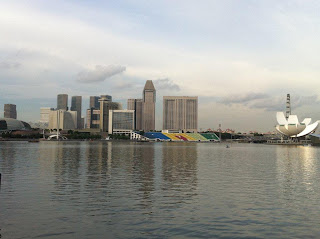Decided to get an executive MBA was one of the biggest decisions I made recently - not only the time commitment, but spending a significant amount of money: how much to spend, which school to go to, whether I would have any life, how I would manage it with work, and all of that. The Exec MBA experience is like a roller coaster, and this September I got on. Many people have asked me what it's like so I thought this post might give people a view from this inside. We just finished our first semester mid-terms so this is a good time to pause for a moment and reflect (and believe me, there haven't been many opportunities to pause...).
In an earlier post I discussed my decision to go to Rutgers and now that I'm there the first thing to say is that I made the right choice. I really believe this program is unique in how it builds a sense of collaboration, trust, and friendship amongst the students. The academics are solid but more than just learning statistics or economics, what really comes out of the program is how to apply leadership and management skills as you work collaboratively with colleagues and professionals from a variety of geographic, industry, and ethnic backgrounds. These "soft skills," as we characterize them in publishing, are not the kinds of things I thought I needed to learn - but now that I'm here, I'm realizing this may be one of the most valuable experiences of the Exec MBA. The first semester at Rutgers fosters an environment where you can assimilate underlying academic basic (law, statistics, economics) that will be more applied in future semesters while also having a laboratory to practice essential business skills such as negotiation and leadership. I've never "studied" these skills before and going through that process is certainly useful. I feel like a vintage car being "tuned up" for business, and already have noticed its positive effect on how I do my job at work. I really think that Rutgers could market this aspect of the program more, because now that I am here, I realize this is probably the most essential thing I was looking for from my MBA, yet didn't know before I arrived.
In other words - before coming, I was focused on things like quality of networking, school reputation, or specifics of the curriculum (did they have a class on this or that interest). Really all external surface factors. The real experience is what the program can teach you about yourself (you get out of it what you put in, certainly) - how relevant you make the homework for yourself, and the quality of the teachers and program. I'm sure there are many schools that can impart these things but what I've discovered is that you can't predetermine where the MBA will take you before you come in. If you are really open to the MBA experience, you will dive deeply into it and let it transform you into the type of informed decision maker, leader, and business strategist who can make the best decisions about where to take your business and your career. This was my real goal, even though I didn't know it, and I'm excited that this two year experience will take me there. Things like career progress and salary will naturally follow.
So in a blink of an eye two months have gone by, an eighth of the program. Does it consume every moment of non-work time? Pretty much. Is it a relationship strain? Yes, but here are two things that help:
1. Really think through and prepare with your spouse what the family will need. Do you need extra day care, cleaning service? How will you help your spouse manage the extra work load falling to them?
2. No matter what you arrange, it will be a strain, so when you can, take evenings off to return to the family. Yes, you will feel strained and worried about school and work. But you start to learn how to keep up with readings, what you can skip or delay. An evening every other week will seem overwhelming to you and terribly infrequent to your spouse but you will both benefit from it.
The hardest part: your day job demands. As with any job, there are ebbs and flows to the overtime and weekends when work starts to back up or you need to travel. This is where the strong friendships and the group dynamics of the Rutgers program really pay off. If you are a good study group they will step in when you are traveling and you will return the favor. You will learn to get by with less sleep, but don't sacrifice your workout or exercise routine: staying in shape and eating healthy are essential to keeping up your stamina. The Exec MBA is a marathon, not a sprint, and you need to go in with proper discipline, but not panic and expend all your energy right away. You need to keep those daily things that keep you going, or you will quickly loose the energy you need.
Two months in, I feel I've gotten the flow. I've had to sacrifice not only hobbies and some favorite activities (like going to the movies or enjoying a fall hike) but also put off friends and cancel reunions with old acquaintances. But pacing yourself is important. A ten minute break to write this post, and now back to my law book for the rest of the day (and prepare for work tomorrow). That's the Sunday life of the exec MBA.
Lean vs Pragmatic vs Design Thinking: Which Product Management Approach
Wins?
-
Yes, it’s the kind of esoteric debate that only geeky Product Managers
could love, but why not? There are those who love each of these and claim
that their...
8 years ago
















































